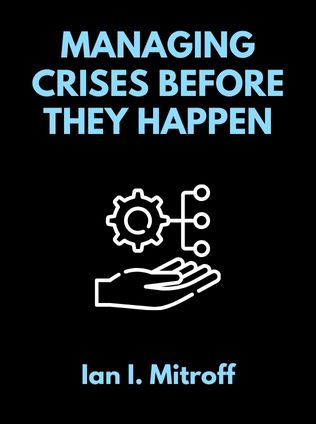
Managing Crises Before They Happen
What Every Executive and Manager Needs to Know about Crisis Management
By Ian I. Mitroff
Published 09/2000
About the Author
Ian I. Mitroff is a distinguished professor of Business Policy at the Marshall School of Business, University of Southern California. He is also the president of Comprehensive Crisis Management, a consulting firm he founded, and was the director of the USC Center for Crisis Management. Mitroff is recognized for his extensive work and research in crisis management, making him a leading authority in the field. Gus Anagnos is the Vice President of Comprehensive Crisis Management, collaborating with Mitroff to provide expert insights and strategies for effective crisis management.
Main Idea
Managing Crises Before They Happen by Ian I. Mitroff and Gus Anagnos provides a comprehensive framework for understanding and preparing for crises. The book emphasizes that while crises, especially human-caused ones, are inevitable, organizations can mitigate their impact through proactive crisis management. By understanding the types of crises, implementing effective mechanisms, considering organizational systems, engaging stakeholders, and developing scenarios, companies can better manage and navigate crises.
Table of Contents
- Introduction
- The Five Components of a Crisis-Management Framework
- Types and Risk Categories of Crises
- Mechanisms to Prepare for and Respond to Crises
- Organizational Systems
- Stakeholders
- Developing Crisis Management Scenarios
- Telling the Truth in Crisis Management
- Assuming Responsibility
- Creative Thinking in Crisis Management
- Finding a Crisis Management Champion
The Five Components of a Crisis-Management Framework
Mitroff and Anagnos present a best-practice model that includes five components essential for effective crisis management: types or risk categories of crises, mechanisms, systems, stakeholders, and scenarios. These components help organizations prepare for, manage, and learn from crises to minimize their impact on business objectives.
Types and Risk Categories of Crises
Crises can be categorized into several types: economic, informational, physical, human resources, reputational, psychopathic acts, and natural disasters. Each category requires different preparations and responses. For instance, economic crises may involve market crashes or labor strikes, while informational crises could include data breaches or loss of key information.
"Every organization must prepare for at least one crisis in each of the various categories or types." - Ian I. Mitroff
Mitroff emphasizes that organizations should not limit their preparations to crises specific to their industry. For example, while a chemical company might prepare for explosions, it should also be ready for crises like product tampering or cyber-attacks.
- Economic crises: labor strikes, market crashes.
- Informational crises: data breaches, loss of key information.
- Physical crises: equipment breakdowns, loss of facilities.
- Human resources crises: loss of key personnel, workplace violence.
- Reputation crises: slander, damage to corporate reputation.
- Psychopathic acts: product tampering, terrorism.
- Natural disasters: earthquakes, floods.
Mechanisms to Prepare for and Respond to Crises
Effective crisis management involves having mechanisms in place to anticipate, detect, respond to, contain, and learn from crises. Signal detection mechanisms are crucial as they help identify early warning signs of potential crises. These signals can be technical or noticed by people within or outside the organization.
Sign up for FREE and get access to 1,400+ books summaries.
You May Also Like
Rich Dad Poor Dad
What the Rich Teach Their Kids About Money - That the Poor and Middle Class Do Not!
By Robert T. KiyosakiFreakonomics
A Rogue Economist Explores the Hidden Side of Everything
By Steven D. Levitt and Stephen J. DubnerThe Lean Startup
How Today's Entrepreneurs Use Continuous Innovation to Create Radically Successful Businesses
By Eric RiesWho Moved My Cheese?
An Amazing Way to Deal with Change in Your Work and in Your Life
By Spencer Johnson, M.D.Factfulness
Ten Reasons We're Wrong About the World – and Why Things Are Better Than You Think
By Hans RoslingMake Your Bed
Little Things That Can Change Your Life...And Maybe the World
By William H. McRaven



















